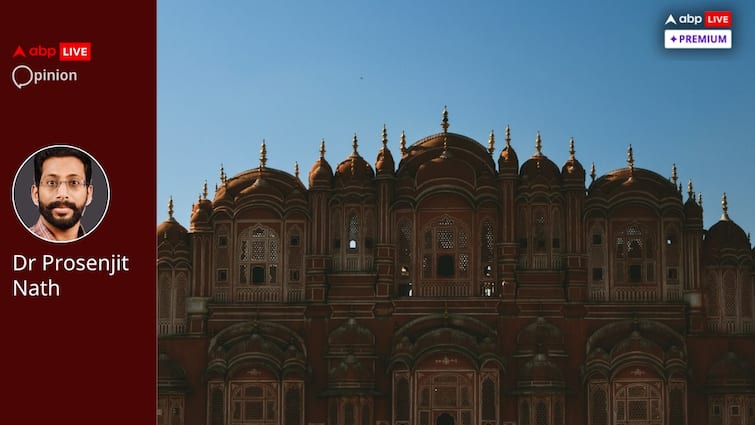Few lands that have been touched by Christian or Islamic imperialism have managed to remain both unconverted and geopolitically intact. In the short span of just over a century, the entire African continent saw its indigenous spiritual systems, once held by over three-fourths of its population, reduced to a mere fraction, supplanted by imported theologies that destroyed native cosmologies and community bonds.
India, or Bharat, stands out as the lone civilisational exception to that fate. Despite a thousand years of invasions, proselytisation, and colonial re-engineering, Sanatan Dharma remains the living soul of this land, guiding more than 75 per cent of its people.
And yet, the imperial project is not over. The battlefield has shifted from armies to academia, from swords to scholarship, from religious missionaries to cultural ones. What we face today is not colonialism in the old sense, but a sophisticated intellectual imperialism disguised as “academic inquiry” and “human rights activism.” The empire that once sought to subjugate India politically now seeks to fragment it ideologically.
The recent controversy surrounding Francesca Orsini, a Hindi scholar from London’s School of Oriental and African Studies (SOAS), perfectly illustrates this continuity of imperial intent. To the casual observer, a white academic specialising in an Indian language may seem harmless, even flattering. But scratch the surface, and a deeper agenda appears. Orsini has consistently used her academic platform to undermine Indian nationalism and delegitimise the cultural unity that binds Bharat together. Her writings accuse Hindi, a language that evolved organically as the voice of a civilisation of “hegemonising” other Indian tongues. Her activism extends beyond the classroom: in 2020, she introduced a resolution in the Seattle City Council opposing India’s Citizenship Amendment Act (CAA) and the National Register of Citizens (NRC), both sovereign measures to protect persecuted minorities and secure national integrity.
Orsini’s deportation from India for violating visa conditions was not “censorship,” as her defenders claim, but an act of national self-respect. No country is obliged to host those who misuse its hospitality to inject ideological poison. Her case is not an isolated one; it belongs to a long lineage of Western scholars who have donned the garb of Indology only to deform it.
Colonial Blueprint Behind Modern Scholarship
The British Empire’s first academic missionaries were more blunt about their purpose. Friedrich Max Müller, the German philologist hired by the East India Company in 1847, openly wrote to his wife that he sought to “uproot the religion of the Vedas” so that “Christianity may step in.” His patron, the British colonial administration, saw Indology as a tool of psychological conquest to make the colonised doubt their own civilisation. Müller’s “translation” of the Rig Veda was not a linguistic exercise but a theological assault, meant to reinterpret Dharmic philosophy through the narrow lens of Abrahamic dogma.
Then came James Mill, the Scottish historian who wrote The History of British India in 1817, a monumental exercise in colonial propaganda. Without ever visiting India or learning a single Indian language, Mill divided Indian history into Hindu, Muslim, and British periods, branding Hindus as “barbaric,” “rude,” and “devoid of virtue.” His text became the foundation of the colonial education system in India, shaping generations of brown bureaucrats who internalised the coloniser’s contempt for their own civilisation.
The West’s new “gift horses,” from Wendy Doniger to Sheldon Pollock to Audrey Truschke, may use more polished language, but their objectives are the same. Doniger’s Freudian psychoanalysis of Hindu texts sexualises revered figures like Ramakrishna Paramhansa and Swami Vivekananda, mocking spiritual devotion as psychological repression. Pollock, astonishingly, blames Sanskrit, the very language of the Upanishads, for modern atrocities like the Holocaust. Truschke, meanwhile, romanticises the genocidal Mughal tyrant Aurangzeb as a misunderstood ruler, even as she maligns Hindu kings as fanatics.
These are not innocent scholarly errors; they are deliberate distortions designed to erode civilisational self-confidence. By portraying Sanatan Dharma as oppressive, Sanskrit as fascist, and nationalism as majoritarian, these academics provide moral ammunition to India’s internal adversaries, activists, NGOs, and political outfits that thrive on perpetuating victimhood narratives.
Reclaiming Bharat’s Narrative
Bharat, however, has always been generous with knowledge. Our intellectual tradition has never feared ideas from elsewhere; it has assimilated them. True seekers from the West, Sister Nivedita, Koenraad Elst, David Frawley, François Gautier, and Maria Wirth approached India not as a patient to be diagnosed but as a teacher to be learned from. They did not seek to subvert Dharma but to understand and celebrate its universality. Their engagement exemplifies what “vidya” truly means: knowledge that liberates, not manipulates.
The tragedy, however, is not just in Western subversion but in Indian neglect. For decades, Indians themselves abandoned Sanskrit, ignored their own intellectual heritage, and outsourced the writing of their history to others. The result: a vacuum eagerly filled by those who wish to define India from the outside. Even today, India’s universities remain more eager to teach Marx, Foucault, and Derrida than Patanjali, Chanakya, or Kalidasa. Until Indians take charge of their own narrative, foreign “experts” will continue to set the terms of debate.
The imperial project survives because Bharat has not yet reclaimed its full civilisational confidence. Its political freedom in 1947 was only the first step; intellectual decolonisation remains unfinished. Every attack on India’s faith, language, or unity, whether through pseudo-scholarship or selective activism, must be recognised as part of a long continuum of imperial intent.
For centuries, empires have sought to break Bharat’s spirit. But despite invasions, partitions, and propaganda, this land still stands tall. Its people still chant the same mantras, celebrate the same festivals, and draw meaning from the same timeless philosophy that once guided rishis and kings alike. Sanatan Dharma endures not because it is rigid, but because it is infinitely adaptive, rooted deeply enough to bend without breaking.
As Bharat rises again economically, militarily, and spiritually, the West’s unease is palpable. The empire may have withdrawn its flag, but its unfinished mission continues in classrooms, think tanks, and “human rights” panels. The question is no longer whether Bharat will survive but whether it will finally tell its own story, on its own terms.
Until that happens, the vultures will keep circling. And the unfinished project of imperialism will remain unfinished because Bharat refuses to die.
(The writer is a technocrat, political analyst, and author)
Disclaimer: The opinions, beliefs, and views expressed by the various authors and forum participants on this website are personal and do not reflect the opinions, beliefs, and views of ABP Network Pvt. Ltd.



